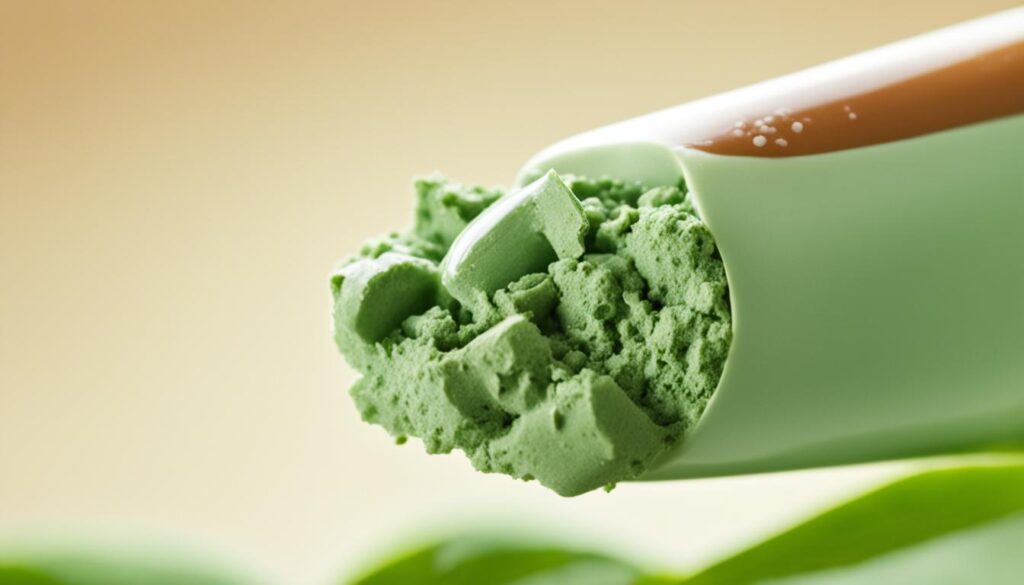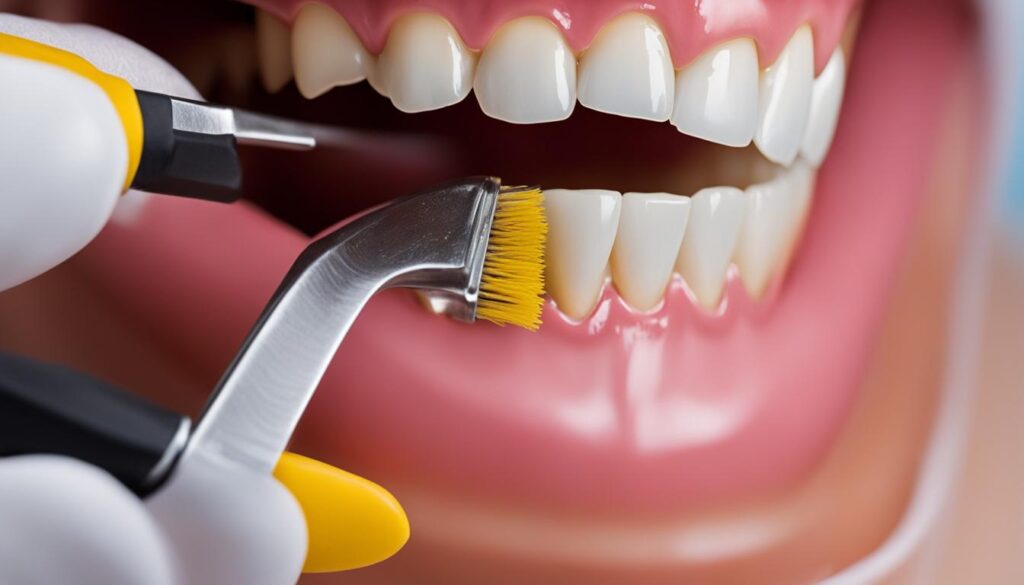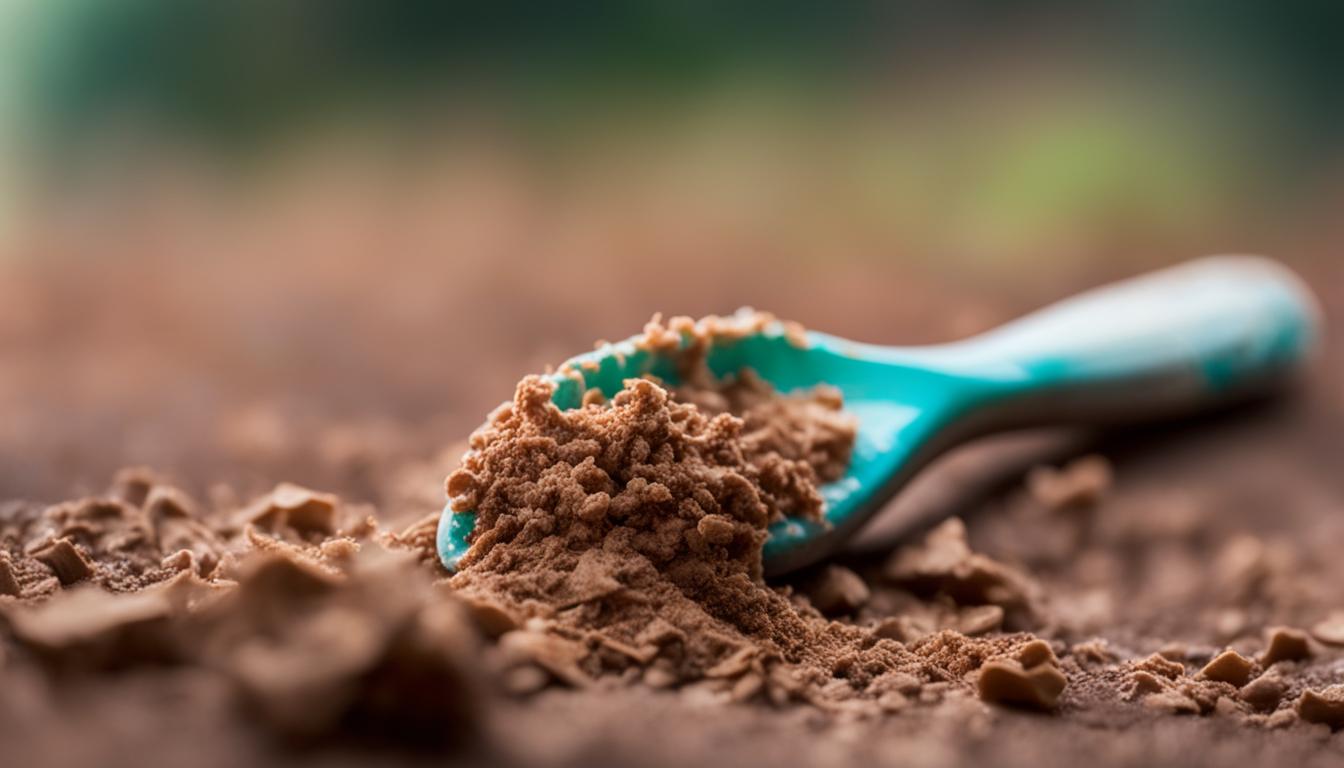Welcome to my article on natural clay toothpaste and its benefits for a healthier smile. In a world where we strive for safer and more natural alternatives, natural clay toothpaste provides a refreshing option for oral care. With its earthy freshness and natural dental care properties, it offers a healthier approach to maintaining a beautiful smile.
Key Takeaways:
- Natural clay toothpaste offers an earthy freshness and natural dental care.
- It provides a safer alternative to traditional toothpastes.
- Bentonite clay, the main ingredient, detoxifies and improves oral health.
- Heavy metal exposure from bentonite clay products should be understood and considered.
- Choosing natural clay toothpaste promotes a healthier smile and enhanced oral hygiene.
The Potential Safety Concerns of Bentonite Clay
While bentonite clay has gained popularity as a natural oral hygiene product, there are growing concerns about its safety. The U.S. Food and Drug Administration (FDA) has issued warnings regarding elevated levels of lead found in some bentonite clay products. Although manufacturers argue that lead is not bioavailable when ingested or applied to the oral mucosa, research suggests that heavy metals can become bioavailable in the human body. These heavy metals, including lead, arsenic, mercury, and cadmium, can pose potentially harmful effects on oral health when ingested or absorbed through the skin or mucosa.
“The presence of heavy metals in bentonite clay products is a significant safety concern for individuals seeking natural alternatives for their oral health.”
The FDA Warning on Elevated Lead Levels
In recent years, the FDA has voiced concerns about the presence of elevated lead levels in certain bentonite clay products. Lead is a toxic heavy metal that can affect various organs in the body, including the nervous system and kidneys. Even low levels of lead exposure have been linked to developmental impairments, particularly in children. While manufacturers emphasize that the lead in bentonite clay is not bioavailable, meaning it does not easily enter the bloodstream, recent research suggests that heavy metals can become bioavailable in the human body, raising concerns about potential health risks.
Potential Health Risks
Exposure to heavy metals like lead, arsenic, mercury, and cadmium can have detrimental effects on overall health, including oral health. These metals have been associated with a range of health problems, from cognitive impairments to an increased risk of cancer. Elevated lead levels are particularly concerning, as no safe level of lead exposure has been identified. While further research is needed to fully understand the long-term effects of using bentonite clay products, it’s important to acknowledge the potential risks and exercise caution.
The Importance of Consumer Awareness
Consumers should be aware of the potential safety concerns associated with bentonite clay products and take steps to mitigate risks. Before using any oral care product, individuals should carefully read labels, check for third-party testing and certifications, and consult with their healthcare providers if they have any concerns. Additionally, maintaining good oral hygiene practices, including regular brushing with a fluoride toothpaste and visiting the dentist regularly, is essential for overall oral health.
Heavy Metal Content in Oral Bentonite Clays (in parts per million)
| Heavy Metal | Average Content | Maximum Content |
|---|---|---|
| Lead | 12 ppm | 45 ppm |
| Arsenic | 5 ppm | 10 ppm |
| Mercury | 4 ppm | 8 ppm |
| Cadmium | 2 ppm | 5 ppm |
Note: The heavy metal content in oral bentonite clays may vary among different brands and products.
To address the safety concerns surrounding bentonite clay and ensure the best oral health outcomes, it is advisable to consider alternative oral care products that have undergone rigorous testing and certification processes. Oral care products containing fluoride, as recommended by dental professionals, can provide effective protection against tooth decay while minimizing potential risks associated with heavy metal exposure.
Risks of Metals in Bentonite Clay
It is important to consider the potential health risks associated with the presence of heavy metals in bentonite clay. Studies have found varying levels of heavy metals, including lead, arsenic, mercury, and cadmium, in oral bentonite clays. These heavy metals can have detrimental effects on the human body, impacting the nervous system and increasing the risk of cancer.
The presence of lead in bentonite clay is particularly concerning. Lead is a toxic metal that can cause severe health issues even at low levels of exposure. There is no safe level of lead exposure, especially for vulnerable populations such as children and pregnant women.
Let’s take a closer look at the potential health risks associated with each of these heavy metals:
| Heavy Metal | Health Risks |
|---|---|
| Lead | Causes neurotoxicity, developmental issues, and cognitive impairments |
| Arsenic | Increases the risk of cancer, affects the cardiovascular system, and leads to skin disorders |
| Mercury | Can cause neurological damage, kidney dysfunction, and impair cognitive function |
| Cadmium | Linked to lung cancer, kidney damage, and skeletal deformities |
Given the potential health risks associated with these heavy metals, using bentonite clay for oral health purposes may not outweigh the benefits it offers. It is essential to prioritize safe and tested alternatives to ensure overall well-being and oral health.
Avoiding Heavy Metals in Oral Bentonite Clays
As the saying goes, “Prevention is better than cure.” When it comes to heavy metals in oral bentonite clays, it is crucial to take preventive measures to minimize the risk of exposure. Here are a few tips to consider:
- Choose reputable brands: Look for oral care products made by well-known and trusted manufacturers who prioritize safety and quality.
- Check for third-party testing: Ensure the product has undergone rigorous testing to confirm its heavy metal levels and safety.
- Read product labels: Pay attention to the ingredients and manufacturing processes mentioned on the packaging, particularly regarding heavy metals.
- Consult dental professionals: Seek advice from dental professionals who can provide guidance on safe and effective oral care products.
By making informed choices and practicing due diligence, we can minimize the potential health risks associated with heavy metals in bentonite clay and prioritize our oral health and overall well-being.
The Appeal of Natural Clay Toothpaste
Many people are drawn to natural clay toothpaste due to its appeal as a safer and more environmentally friendly alternative to traditional toothpaste. Natural clay toothpaste offers a natural and effective option for maintaining oral hygiene without the risks associated with traditional toothpaste that often contain toxic ingredients.
Traditional toothpastes often contain toxic ingredients, such as triclosan, sodium lauryl sulfate (SLS), aspartame, propylene glycol, and fluoride. These ingredients have been linked to various health concerns, including antibiotic resistance, skin irritation, organ system toxicity, neurotoxicity, and developmental impairments.
Using natural clay toothpaste allows individuals to prioritize their oral health without exposing themselves to potentially harmful chemicals. Natural clay toothpaste is free from toxic ingredients and relies on the power of nature to effectively clean and protect the teeth and gums.
“By choosing natural clay toothpaste, you’re making a conscious decision to prioritize your health and well-being.”
When it comes to oral health products, it’s important to select options that support your overall well-being. Natural clay toothpaste provides a gentle yet effective cleansing experience, leaving your mouth feeling fresh and your teeth squeaky clean. The earthy freshness and natural ingredients offer a refreshing change from the artificial flavors and harmful additives found in traditional toothpastes.
Not only does natural clay toothpaste offer a safer choice for your oral care routine, but it also demonstrates a commitment to our planet. By using products made from natural ingredients, you can reduce your environmental impact and promote sustainability.
So why settle for conventional toothpaste with potentially harmful ingredients when you can choose natural clay toothpaste for a healthier and more eco-friendly oral care experience?
| Traditional Toothpaste | Natural Clay Toothpaste |
|---|---|
| Contains toxic ingredients | Free from toxic ingredients |
| Possible health risks | No known health risks |
| Artificial flavors and additives | Natural ingredients and flavors |
| Environmental impact | Environmentally friendly |

What is Bentonite Clay?
Bentonite clay is a natural remedy derived from aged volcanic ash. It has been used for centuries due to its various health benefits and therapeutic properties. This soft clay is rich in minerals such as aluminium, calcium, silicon, iron, and magnesium, making it a valuable addition to natural healthcare.
One of the unique characteristics of bentonite clay is its negative charge. This negative charge allows the clay to attract and bind with positively charged toxins and impurities. Imagine it as a magnet for harmful substances! When applied to the teeth, gums, and mouth, bentonite clay works as an effective cleanser and detoxifier.
Let’s take a closer look at the key components and properties of bentonite clay:
Volcanic Ash
Bentonite clay is formed from volcanic ash that has weathered and aged over time. The volcanic ash provides the clay with its unique mineral content, which contributes to its healing properties.
Negative Charge
The negative charge of bentonite clay is what sets it apart from other clays. This negative charge allows the clay to attract positively charged particles, such as toxins and impurities, and bind them together for easy elimination.
Mineral Content
Bentonite clay is rich in minerals that are beneficial for the body. These minerals include aluminium, calcium, silicon, iron, and magnesium. When applied topically or used in oral care, these minerals can provide nourishment and support overall health.

With its natural composition and unique properties, bentonite clay offers a powerful natural remedy for promoting oral health and overall well-being. It’s time to harness the detoxifying and cleansing abilities of this incredible clay!
Dental Benefits of Bentonite Clay
Brushing teeth with bentonite clay provides several dental benefits. It promotes remineralization by delivering essential minerals to the teeth, strengthening them and protecting against decay. Bentonite clay also acts as a gentle abrasive, helping to remove plaque and tartar without causing damage to the enamel. It has natural cleaning properties that can remove stains from the teeth, resulting in a brighter and whiter smile. Additionally, bentonite clay has antimicrobial properties that can help kill bacteria and freshen breath.

| Dental Benefits of Bentonite Clay: | |
|---|---|
| Promotes Remineralization | Strengthens teeth and protects against decay |
| Removes Plaque and Tartar | Gentle abrasive action without enamel damage |
| Whitens Teeth | Removes stains for a brighter smile |
| Kills Bacteria | Antimicrobial properties for fresher breath |
How to Use Bentonite Clay for Teeth
Using bentonite clay for teeth is a simple and effective way to incorporate natural oral health into your dental care routine. By adding this powerful ingredient to your brushing routine, you can enhance your dental hygiene and enjoy the benefits of a healthier smile.
After brushing your teeth with a traditional toothpaste, it’s time to introduce bentonite clay into your routine. To get started, follow these simple steps:
- Wet your toothbrush with water.
- Dip your wet toothbrush into powdered or paste form of bentonite clay.
- Brush your teeth for at least 2 minutes, making sure to cover all surfaces.
- Rinse your mouth thoroughly with water after brushing.
This method allows the bentonite clay to effectively clean your teeth and gums, removing plaque and promoting a healthier oral environment. By incorporating bentonite clay into your dental care routine, you can experience the natural oral health benefits it offers.
Alternatively, you can also use bentonite clay as a mouthwash or in tooth powder form. These options provide additional opportunities to harness the power of bentonite clay and maintain optimal oral health.
Image: 
Natural Whitening with Bentonite Clay
Looking for a natural and effective solution to teeth whitening? Look no further than bentonite clay. This powerful natural ingredient offers remarkable whitening properties that can help you achieve a brighter and more radiant smile.
Stubborn stains from coffee, wine, tea, red lipstick, and nicotine can be challenging to remove with regular toothpaste. But bentonite clay has the ability to bind to these stains and toxins, lifting them away from the teeth and leaving behind a whiter appearance.
But the benefits of bentonite clay don’t stop at teeth whitening. This natural ingredient also works wonders in preventing and removing plaque, leading to cleaner and healthier teeth. By gently removing plaque buildup, bentonite clay provides an effective way to maintain optimal oral hygiene.
Regular use of bentonite clay can contribute to cleaner teeth, a brighter smile, and improved overall oral health. Say goodbye to stubborn stains and hello to a naturally whiter and healthier smile.
Benefits of Bentonite Clay for Teeth Whitening:
- Effective removal of stubborn stains
- Prevention and removal of plaque
- Brighter and whiter smile
- Improved overall oral health
| Stains | Effectiveness of Bentonite Clay |
|---|---|
| Coffee | Highly effective |
| Wine | Highly effective |
| Tea | Highly effective |
| Red lipstick | Highly effective |
| Nicotine | Highly effective |
Experience the power of bentonite clay for yourself and unlock the natural whitening benefits it offers. Say goodbye to stubborn stains and hello to cleaner and healthier teeth.
External Benefits of Bentonite Clay
In addition to its dental benefits, bentonite clay offers a multitude of external uses that promote skin health. The softening properties and detoxifying nature of bentonite clay make it a versatile solution for various skin concerns. From calming inflammation to eliminating acne-causing bacteria, bentonite clay can be a game-changer in your skincare routine.
Softens Rough Skin
Bentonite clay is known for its ability to soften rough skin and provide a smoother complexion. Its rich mineral content nourishes the skin, leaving it hydrated and supple. By removing dead skin cells and enhancing moisture retention, bentonite clay can transform rough patches into soft and touchable skin.
Heals Blemishes
Bentonite clay’s absorbent properties make it an excellent remedy for healing blemishes. When applied topically, the clay draws out impurities and excess oil from the pores, reducing redness and inflammation. Its antibacterial properties also help prevent further breakouts, promoting a clearer and healthier complexion.
Eliminates Acne-Causing Bacteria
Acne is often caused by the proliferation of harmful bacteria on the skin’s surface. Bentonite clay has antimicrobial properties that can effectively eliminate acne-causing bacteria, reducing the occurrence of breakouts. Regular use of bentonite clay as a facial mask can help control acne and improve overall skin health.
“Bentonite clay’s external uses extend beyond skincare. It is a versatile natural remedy for many skin conditions, providing relief and promoting overall skin health.”
Detoxifies and Cleanses
Bentonite clay acts as a potent detoxifier, purging the skin of toxins and impurities. Its negative charge attracts positively charged toxins, effectively removing them from the skin’s surface. This detoxifying action revitalizes the skin, restoring its natural radiance and promoting a clearer and healthier complexion.
Overall, bentonite clay offers a wide range of external benefits for skin health. Whether you’re looking to soften rough skin, heal blemishes, eliminate acne-causing bacteria, or detoxify your skin, incorporating bentonite clay into your skincare routine can help you achieve a healthier and more radiant complexion.
| External Benefits of Bentonite Clay | Description |
|---|---|
| Softens Rough Skin | Bentonite clay’s mineral content nourishes and hydrates the skin, leaving it soft and smooth. |
| Heals Blemishes | Its absorbent properties draw out impurities, reduce redness, and promote clearer skin. |
| Eliminates Acne-Causing Bacteria | Antimicrobial properties help eradicate acne-causing bacteria, preventing breakouts. |
| Detoxifies and Cleanses | By attracting and removing toxins, bentonite clay promotes a clearer and healthier complexion. |
The Importance of Choosing Oral Care Products Wisely
When it comes to taking care of our oral hygiene, selecting the right oral care products is crucial. In order to maintain optimal dental health, we need to consider not only the promised benefits of these products but also their potential risks. Ensuring that the products we use have been thoroughly tested for safety and comply with health regulations is essential for both our oral and overall well-being.
Traditional toothpastes, despite being widely available and marketed, often contain toxic ingredients that can have adverse effects on our health. These ingredients, such as triclosan, sodium lauryl sulfate (SLS), and fluoride, have been linked to various health concerns including antibiotic resistance, skin irritation, organ toxicity, neurotoxicity, and developmental impairments. It’s concerning that products designed to promote oral health can actually have such detrimental effects on our overall well-being.
That’s why it’s important to explore alternative options, such as natural clay toothpaste, which offers a safer and more environmentally friendly solution. Natural clay toothpaste, like those containing bentonite clay, does not contain harmful chemicals and is free from toxic ingredients that can jeopardize our health. By choosing natural oral care products, we prioritize both our safety and the preservation of our environment.
As dental professionals, it is our responsibility to educate patients about the importance of selecting oral care products wisely. By emphasizing the significance of safety and efficacy, we can empower individuals to make informed choices for their dental hygiene. Recommending natural clay toothpaste as an alternative to traditional toothpastes can provide our patients with a safer option that promotes oral health while minimizing potential risks.
By selecting oral care products wisely, we take an active role in safeguarding our oral health and overall well-being. Natural clay toothpaste offers a refreshing and effective solution that not only benefits our dental hygiene but also contributes to a healthier and more sustainable future.
The Role of Dental Hygienists in Patient Education
Dental hygienists play a vital role in patient education, particularly when it comes to oral health products. As a dental hygienist, my goal is to provide the best possible advice to my patients by staying informed about the latest research and developments in the field of oral care. By offering valuable insights and guidance, I can help patients make informed decisions about their oral health and overall well-being.
One area where dental hygienists can make a significant impact is in recommending natural alternatives for maintaining oral hygiene. Natural alternatives, such as bentonite clay toothpaste, offer patients a safer and more natural option to traditional toothpastes that may contain toxic ingredients.
By educating patients about the benefits of natural alternatives, I can empower them to make choices that prioritize their health. Bentonite clay toothpaste, for example, provides not only effective cleaning properties but also the potential for teeth remineralization, plaque removal, and a brighter smile.
Through patient education, I can highlight the advantages of natural options, including their ability to promote oral health without the potential risks associated with conventional products. By recommending natural alternatives, I help my patients take control of their oral health and make choices that align with their overall wellness goals.
“As a dental hygienist, I believe in the power of patient education in promoting oral health and well-being. By providing information and guidance on natural alternatives, I can support my patients in making informed decisions that prioritize their overall health.”
Ultimately, the role of dental hygienists goes beyond routine cleanings and dental exams. We have the opportunity to be advocates for our patients’ oral health and provide them with the knowledge and resources they need to maintain a healthy and vibrant smile.
| Dental Hygienists’ Role in Patient Education | Benefits |
|---|---|
| Providing up-to-date information on oral health products | Empowering patients to make informed decisions |
| Highlighting natural alternatives | Offering safer and more natural options |
| Explaining the advantages of natural alternatives | Promoting oral health without potential risks |
| Educating patients on the benefits of natural options | Empowering patients to prioritize their health |
Conclusion
Natural clay toothpaste, like those containing bentonite clay, offers a range of dental health benefits. Not only does it provide an earthy freshness, but it also serves as a safer alternative to traditional toothpastes that often contain toxic ingredients. Research has shown that bentonite clay can promote teeth remineralization, effectively remove plaque and stains, kill bacteria, and freshen breath.
While it’s important to be aware of the potential risks associated with heavy metal exposure from bentonite clay products, incorporating natural clay toothpaste into a comprehensive oral hygiene routine can significantly contribute to a healthier smile and enhanced oral health. By choosing natural clay toothpaste, individuals can enjoy the benefits of a safer and more environmentally friendly option for maintaining oral hygiene without compromising their wellbeing.
With its ability to deliver the benefits of natural minerals, remove harmful toxins, and promote overall oral health, natural clay toothpaste is a compelling choice. By prioritizing dental health and opting for products that offer natural dental care, individuals can embrace the earthy freshness and experience the numerous dental health benefits that natural clay toothpaste has to offer.
FAQ
What are the benefits of natural clay toothpaste for a healthier smile?
Natural clay toothpaste offers several benefits for a healthier smile. It provides an earthy freshness and is a safer alternative to traditional toothpastes that often contain toxic ingredients. Bentonite clay, the main ingredient in natural clay toothpaste, can promote teeth remineralization, remove plaque and stains, kill bacteria, and freshen breath.
Are there any potential safety concerns with bentonite clay?
Yes, there are potential safety concerns associated with bentonite clay. The FDA has warned about elevated levels of lead in some bentonite clay products. Although manufacturers claim that lead is not bioavailable when ingested or applied to the oral mucosa, research suggests that heavy metals like lead can become bioavailable in the human body, posing potential health risks.
What are the risks of metals in bentonite clay?
Bentonite clay can contain heavy metals such as lead, arsenic, mercury, and cadmium. These metals can have detrimental effects on the human body, including affecting the nervous system and increasing the risk of cancer. The presence of lead is particularly concerning, as there is no safe level of lead exposure.
Why should I choose natural clay toothpaste over traditional toothpaste?
Natural clay toothpaste offers a safer and more environmentally friendly option compared to traditional toothpastes that often contain toxic ingredients like triclosan, sodium lauryl sulfate (SLS), aspartame, propylene glycol, and fluoride. These ingredients have been linked to various health concerns, while natural clay toothpaste provides effective oral care without these risks.
What is bentonite clay and what are its properties?
Bentonite clay is a natural remedy composed of aged volcanic ash. It is rich in minerals such as aluminium, calcium, silicon, iron, and magnesium. One of its unique properties is its negative charge, which allows it to attract and bind with positively charged toxins and impurities, making it an effective cleanser and detoxifier for teeth, gums, and the mouth.
What are the dental benefits of using bentonite clay?
Using bentonite clay for teeth provides several dental benefits. It promotes remineralization by delivering essential minerals to the teeth, strengthens them, and protects against decay. Bentonite clay acts as a gentle abrasive, removing plaque and tartar without damaging the enamel. Its natural cleaning properties can also remove stains from the teeth, resulting in a brighter and whiter smile. Additionally, bentonite clay has antimicrobial properties that can help kill bacteria and freshen breath.
How do I use bentonite clay for teeth?
Brush your teeth with a traditional toothpaste first, then dip a wet toothbrush into powdered or paste form of bentonite clay and brush your teeth for at least 2 minutes. Rinse your mouth thoroughly with water afterward. Bentonite clay can also be used as a mouthwash or in tooth powder form. It is recommended to use bentonite clay daily to achieve optimal oral health benefits.
Can bentonite clay whiten teeth?
Yes, bentonite clay offers natural teeth whitening properties. It is effective in removing stubborn stains from the teeth, such as those from coffee, wine, tea, red lipstick, and nicotine. By binding to these stains and toxins, bentonite clay helps lift them from the teeth, resulting in a whiter appearance. Additionally, bentonite clay helps prevent and remove plaque, leading to cleaner and healthier teeth.
Are there any external benefits of bentonite clay?
Yes, bentonite clay has external uses for skin health. It can be used topically to soften rough skin, heal blemishes, and eliminate acne-causing bacteria. The absorbing and detoxifying properties of bentonite clay make it an effective treatment for various skin conditions. By removing impurities and toxins from the skin, bentonite clay can help improve overall skin health and appearance.
Why is it important to choose oral care products wisely?
Choosing oral care products wisely is important because it ensures that you prioritize safety and efficacy. Traditional toothpastes often contain toxic ingredients that can have adverse effects on health. By opting for natural alternatives like natural clay toothpaste, you can maintain oral hygiene without the risks associated with traditional toothpastes.
What role do dental hygienists play in patient education?
Dental hygienists play a vital role in patient education, particularly when it comes to oral health products. It is important for dental hygienists to stay informed about the latest research and developments in the field of oral care to provide the best advice to patients. Recommending natural alternatives like bentonite clay toothpaste can offer patients a safer and more natural option for maintaining oral hygiene.
What are the dental health benefits of natural clay toothpaste?
Natural clay toothpaste, including those containing bentonite clay, offer several dental health benefits. It provides an earthy freshness and a safer alternative to traditional toothpastes. Bentonite clay promotes teeth remineralization, removes plaque and stains, kills bacteria, and freshens breath. Using natural clay toothpaste as part of a comprehensive oral hygiene routine can contribute to a healthier smile and enhanced oral health.

